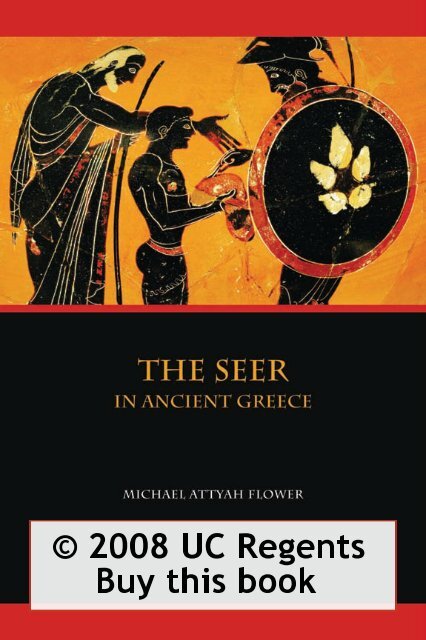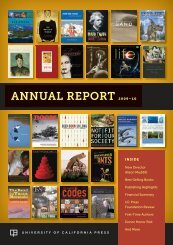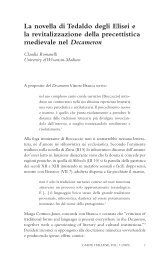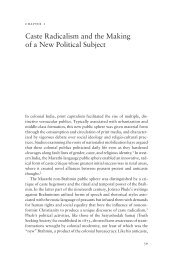The Seer in Ancient Greece - University of California Press
The Seer in Ancient Greece - University of California Press
The Seer in Ancient Greece - University of California Press
Create successful ePaper yourself
Turn your PDF publications into a flip-book with our unique Google optimized e-Paper software.
©2008UCRegents<br />
Buythisbook
<strong>University</strong> <strong>of</strong> <strong>California</strong> <strong>Press</strong>, one <strong>of</strong> the most<br />
dist<strong>in</strong>guished university presses <strong>in</strong> the United States,<br />
enriches lives around the world by advanc<strong>in</strong>g scholarship<br />
<strong>in</strong> the humanities, social sciences, and natural<br />
sciences. Its activities are supported by the UC <strong>Press</strong><br />
Foundation and by philanthropic contributions from<br />
<strong>in</strong>dividuals and <strong>in</strong>stitutions. For more <strong>in</strong>formation,<br />
visit www.ucpress.edu.<br />
<strong>University</strong> <strong>of</strong> <strong>California</strong> <strong>Press</strong><br />
Berkeley and Los Angeles, <strong>California</strong><br />
<strong>University</strong> <strong>of</strong> <strong>California</strong> <strong>Press</strong>, Ltd.<br />
London, England<br />
© 2008 by <strong>The</strong> Regents <strong>of</strong> the <strong>University</strong> <strong>of</strong> <strong>California</strong><br />
Library <strong>of</strong> Congress Catalog<strong>in</strong>g-<strong>in</strong>-Publication Data<br />
Flower, Michael Attyah, 1956–.<br />
<strong>The</strong> seer <strong>in</strong> ancient <strong>Greece</strong> / Michael Attyah Flower.<br />
p. cm.<br />
Includes bibliographical references and <strong>in</strong>dex.<br />
isbn 978-0-520-25229-5 (cloth : alk. paper)<br />
1. Oracles, Greek. 2. Prophets — <strong>Greece</strong>.<br />
3. Div<strong>in</strong>ation — <strong>Greece</strong>. 4. <strong>Greece</strong> — Religious life<br />
and customs. I. Title.<br />
BF1765.F56 2008<br />
133.30938 —dc22 2007004264<br />
Manufactured <strong>in</strong> the United States <strong>of</strong> America<br />
16 15 14 13 12 11 10 09 08 07<br />
10 9 8 7 6 5 4 3 2 1<br />
This book is pr<strong>in</strong>ted on Natures Book, which conta<strong>in</strong>s<br />
50% post-consumer waste and meets the m<strong>in</strong>imum<br />
requirements <strong>of</strong> ansi/niso z39.48-1992 (r 1997)<br />
(Permanence <strong>of</strong> Paper).
one<br />
. Problems, Methods,<br />
and Sources<br />
Surpris<strong>in</strong>g as it may seem, the oracle’s replies to<br />
questions are rarely vague. . . . But I suppose that<br />
it would be difficult for any scientific <strong>in</strong>vestigation<br />
either to prove or disprove conclusively the validity<br />
<strong>of</strong> his pronouncements.<br />
His Hol<strong>in</strong>ess the 14th the Dalai Lama<br />
Tenz<strong>in</strong> Gyatso, Freedom <strong>in</strong> Exile<br />
One <strong>of</strong> the reasons for this neglect [by Assyriologists]<br />
is perhaps the extraord<strong>in</strong>ary monotony <strong>of</strong> the treatises<br />
on div<strong>in</strong>ation that make up the pr<strong>in</strong>cipal pieces <strong>of</strong> the<br />
dossier. But I wonder whether the ma<strong>in</strong> reason is not that<br />
div<strong>in</strong>ation is considered, consciously or unconsciously,<br />
to be a simple superstition, trivial, outdated, and not<br />
really deserv<strong>in</strong>g <strong>of</strong> attention.<br />
Jean Bottéro, Mesopotamia: Writ<strong>in</strong>g, Reason<strong>in</strong>g,<br />
and the Gods<br />
SETTING THE STAGE<br />
When most <strong>of</strong> us th<strong>in</strong>k <strong>of</strong> Greek div<strong>in</strong>ation, the first th<strong>in</strong>g that comes to m<strong>in</strong>d is the<br />
oracle <strong>of</strong> Apollo at Delphi, where the Pythia, possessed by the god, delivered oracles<br />
while seated on her tripod. Yet as famous as Delphi and the Pythia may be, due<br />
<strong>in</strong> part to the large role that Delphi plays both <strong>in</strong> Greek tragedy and <strong>in</strong> the historical<br />
narrative <strong>of</strong> Herodotus, neither Delphi nor any other oracular center, nor even<br />
all such centers collectively, could have constituted the major access to div<strong>in</strong>ation<br />
<strong>in</strong> Greek society. At Delphi, prophecies were given only on the seventh <strong>of</strong> each<br />
month, and not at all dur<strong>in</strong>g the three w<strong>in</strong>ter months when Apollo was away. 1 Thus<br />
very few Greeks were <strong>in</strong> a position to consult Delphi, and any consultations that did<br />
occur needed to be planned out well <strong>in</strong> advance. And even if one appeared on the<br />
1. Eur. Ion 93; Plut. Mor. 292d.<br />
1
ight day and could afford all <strong>of</strong> the prelim<strong>in</strong>ary sacrifices, there was no guarantee<br />
that one would get a turn to put one’s question. This depended on the number <strong>of</strong><br />
<strong>in</strong>quirers, some <strong>of</strong> whom may have enjoyed promanteia (the right <strong>of</strong> jump<strong>in</strong>g the<br />
l<strong>in</strong>e). Yet, as we shall see, div<strong>in</strong>ation was a major system <strong>of</strong> knowledge and belief<br />
for the Greeks and was practiced <strong>in</strong> regard to every sort <strong>of</strong> important question.<br />
So if the Greeks were not constantly mak<strong>in</strong>g hasty trips to Delphi, how did they<br />
access div<strong>in</strong>e knowledge? <strong>The</strong>re were many less prom<strong>in</strong>ent oracular sites <strong>in</strong> Boeotia;<br />
but these would have been denied to Athenians dur<strong>in</strong>g the long periods <strong>of</strong> war<br />
between them and the Boeotians. Greeks from the Peloponnese would also have<br />
found the trek to Delphi expensive and <strong>in</strong>convenient. <strong>The</strong> most authoritative oracle<br />
<strong>in</strong> the Peloponnese was at Olympia, and this would have seen heavy use and long<br />
l<strong>in</strong>es, especially at the time <strong>of</strong> the Olympic games. <strong>The</strong> oracle <strong>of</strong> Zeus at Dodona<br />
<strong>in</strong> Epirus was located <strong>in</strong> a remote part <strong>of</strong> <strong>Greece</strong> and, moreover, was far from the<br />
sea. 2 In any case, the <strong>in</strong>dividual who faced an unexpected decision or the commander<br />
<strong>in</strong> the field who wanted to know whether it was a good day to fight needed a more<br />
immediate access to div<strong>in</strong>e knowledge and guidance than oracular consultation<br />
could possibly provide. This immediate access was provided by the class <strong>of</strong> <strong>in</strong>dividuals<br />
known as seers. 3<br />
<strong>The</strong> ancient Greek word for “seer” is mantis, and the plural is manteis. Rather<br />
than attempt to <strong>in</strong>troduce a new word <strong>in</strong>to English usage, I will use the translation<br />
“seer” throughout this book. <strong>Seer</strong>s played a fundamental role <strong>in</strong> Greek culture. In<br />
fact, their presence was pervasive. We know the names <strong>of</strong> about seventy “historical”<br />
seers (as opposed to mythical/legendary ones), some <strong>of</strong> whom were <strong>in</strong>dividuals<br />
<strong>of</strong> considerable <strong>in</strong>fluence. Many more seers are left anonymous by our sources,<br />
even when their presence and contribution were crucial to the matters at hand. This<br />
anonymity contributes to the false modern sense that seers merely validated decisions<br />
that had already been made by their superiors and employers. Part <strong>of</strong> my task<br />
is to restore the seer to his, and her, appropriate place <strong>of</strong> prom<strong>in</strong>ence <strong>in</strong> archaic and<br />
classical Greek society.<br />
This is <strong>in</strong>tended to be an <strong>in</strong>novative book, but not <strong>in</strong> the sense <strong>of</strong> promot<strong>in</strong>g some<br />
outlandish thesis or advanc<strong>in</strong>g arguments that are based on either a misuse or a par-<br />
2. Most <strong>of</strong> the lead tablets from Dodona, on which <strong>in</strong>quirers wrote their questions, are written <strong>in</strong><br />
Northwest Greek, although others are <strong>in</strong> a variety <strong>of</strong> dialects. See Parke 1967: 101 and Christidis,<br />
Dakaris, and Vokotopoulou 1999: 67–68.<br />
3. A po<strong>in</strong>t well made by Parker (2005: 118–19).<br />
2 . Problems, Methods, and Sources
tial use <strong>of</strong> evidence. Rather, this study has as its aim to stimulate further discussion<br />
and to place the person <strong>of</strong> the seer <strong>in</strong> its appropriate historical context. <strong>Seer</strong>s were<br />
far more important <strong>in</strong> Greek society than the scattered evidence explicitly <strong>in</strong>dicates.<br />
<strong>The</strong>y are always lurk<strong>in</strong>g just beneath the surface <strong>of</strong> historical texts; they rear their<br />
heads only when they are <strong>in</strong>volved <strong>in</strong> some extraord<strong>in</strong>ary action. <strong>The</strong> most famous<br />
example is arguably Tisamenus <strong>of</strong> Elis, the seer who helped the Spartans to w<strong>in</strong> their<br />
decisive victory over the Persians at Plataea <strong>in</strong> 479 b.c. 4 It would have been easy<br />
enough for Herodotus to narrate the events <strong>of</strong> that campaign without ever mention<strong>in</strong>g<br />
the name <strong>of</strong> Tisamenus or the fact that Plataea was merely the first <strong>of</strong> five<br />
famous victories that he won. How many other seers who played prom<strong>in</strong>ent roles<br />
<strong>in</strong> the battles <strong>of</strong> ancient <strong>Greece</strong>, as well as <strong>in</strong> other areas <strong>of</strong> life, went unmentioned?<br />
<strong>The</strong>y make their appearance <strong>in</strong> Herodotus and Xenophon when their actions<br />
seemed unusually noteworthy or when the author had a particular literary or<br />
rhetorical purpose <strong>in</strong> m<strong>in</strong>d.<br />
Various aspects <strong>of</strong> this subject have been dealt with <strong>in</strong> articles and monographs,<br />
but there has never been a book-length study <strong>of</strong> Greek seers <strong>in</strong> any language. 5 Nor<br />
has there been a comprehensive and synthetic treatment <strong>of</strong> Greek div<strong>in</strong>ation as a<br />
whole s<strong>in</strong>ce the n<strong>in</strong>eteenth century. 6 This book is about the role and function <strong>of</strong><br />
seers <strong>in</strong> Greek society, the techniques <strong>of</strong> their art, and the system <strong>of</strong> belief with<strong>in</strong><br />
which they operated. Part <strong>of</strong> the purpose <strong>of</strong> this study is to recover as far as possible<br />
who seers were and what activities they engaged <strong>in</strong>. Another purpose, however,<br />
is to retrieve the image and representation <strong>of</strong> the seer. Just as important as what historical<br />
seers actually said and did is the way that society imag<strong>in</strong>ed the seer and the<br />
way <strong>in</strong> which seers represented themselves. Representation is not always, or even<br />
usually, identical with reality, but the relationship between representation and reality<br />
can tell us a great deal about a society’s values and beliefs. Questions <strong>of</strong> belief<br />
4. Hdt. 9.33–36.<br />
5. <strong>The</strong> most thorough studies are Kett 1966 (<strong>in</strong> German and largely a prosopography), Pritchett<br />
1979: 47–90 (very technical), Roth 1982 (a PhD thesis), and Burkert 1992 (on the archaic age).<br />
Two <strong>of</strong>ten cited articles deal<strong>in</strong>g with seers are Bremmer 1993 and 1996, although I f<strong>in</strong>d myself <strong>in</strong><br />
disagreement with his views. Dillery (2005) makes many <strong>in</strong>terest<strong>in</strong>g suggestions and observations.<br />
Parker (2005: 116–22) gives a succ<strong>in</strong>ct account <strong>of</strong> seers at Athens.<br />
6. <strong>The</strong> most complete study <strong>of</strong> Greek div<strong>in</strong>ation <strong>in</strong> its various forms is Bouché-Leclercq 1879–<br />
82. Volume 1 deals with the various types <strong>of</strong> div<strong>in</strong>ation <strong>in</strong> <strong>Greece</strong>. Bloch 1984 and 1991 are very<br />
succ<strong>in</strong>ct <strong>in</strong>troductions. Dream <strong>in</strong>terpretation is well surveyed by Näf (2004), who provides a comprehensive<br />
bibliography on this topic. Johnston (2005) gives a concise survey <strong>of</strong> the modern study<br />
<strong>of</strong> Greek and Roman div<strong>in</strong>ation.<br />
Problems, Methods, and Sources . 3
are also important here because belief conditions perception and the perception <strong>of</strong><br />
a seer’s clients <strong>in</strong> turn necessarily conditioned his own conception <strong>of</strong> his role. 7<br />
I am limit<strong>in</strong>g myself pr<strong>in</strong>cipally to the period 800–300 b.c., for that is where most<br />
<strong>of</strong> the evidence lies. <strong>The</strong> treatment is synthetic, rather than diachronic. We simply<br />
do not have the evidence to write an account <strong>of</strong> Greek religion that posits a devolution<br />
<strong>of</strong> mantic authority from a time when mantic power and royal power were<br />
concentrated <strong>in</strong> the same person, the k<strong>in</strong>g, to later periods when the power <strong>of</strong> the<br />
k<strong>in</strong>g was divested <strong>in</strong>to a number <strong>of</strong> less powerful functionaries. 8<br />
In my attempt to recover what it meant to be a seer and how a seer might represent<br />
himself, the follow<strong>in</strong>g questions will be especially important: How did seers<br />
fashion an image for themselves? What k<strong>in</strong>d <strong>of</strong> image was important? What was the<br />
relationship between image mak<strong>in</strong>g and actual success <strong>in</strong> one’s career? And given<br />
that the rituals <strong>of</strong> div<strong>in</strong>ation constituted a type <strong>of</strong> public performance, how did the<br />
seer go about script<strong>in</strong>g his own role? Our ancient sources do not address these types<br />
<strong>of</strong> questions directly, and so the answers must be <strong>in</strong>ferred through a close read<strong>in</strong>g<br />
<strong>of</strong> texts. Recent work on the anthropology <strong>of</strong> div<strong>in</strong>ation can provide both a theoretical<br />
framework and clues for how to read our sources. 9<br />
One <strong>of</strong> the most difficult mental exercises that the study <strong>of</strong> history requires is to<br />
th<strong>in</strong>k beyond established questions and even beyond the categories <strong>of</strong> experience<br />
and structures <strong>of</strong> thought that give rise to such questions. Some <strong>of</strong> the established<br />
questions concern<strong>in</strong>g Greek div<strong>in</strong>ation are these: Did the Pythia really compose her<br />
own verse oracles, and, whatever forms her pronouncements took, were her consultants<br />
guided by them <strong>in</strong> any significant way? Did generals and statesmen really<br />
let their strategy and movements be dictated by omens? Did seers <strong>in</strong>fluence decision<br />
mak<strong>in</strong>g, or were they merely pawns <strong>in</strong> the hands <strong>of</strong> their employers?<br />
<strong>The</strong> answers to such questions <strong>of</strong>ten reveal more about the cultural assumptions<br />
<strong>of</strong> modern historians than about those <strong>of</strong> the Greeks. And so it is common to be told<br />
that the priests at Delphi, who knew the questions <strong>in</strong> advance, put <strong>in</strong>to verse the<br />
<strong>in</strong>articulate rambl<strong>in</strong>gs <strong>of</strong> the Pythia; that generals cynically (or at least consciously)<br />
7. To adapt what McSweeney (1974: 6) says about priesthood.<br />
8. Halliday (1913: 54–98) argues that the mantis is the descendant <strong>of</strong> the primitive medic<strong>in</strong>e man<br />
and that the k<strong>in</strong>gs <strong>of</strong> the legendary past were manteis. His book was much <strong>in</strong>fluenced by the theory<br />
<strong>of</strong> the development <strong>of</strong> religion from magic <strong>in</strong> J. G. Frazer’s famous, but now methodologically<br />
outdated, Golden Bough (first published <strong>in</strong> 1890 <strong>in</strong> two volumes, and then expanded <strong>in</strong>to<br />
twelve volumes between 1906 and 1915).<br />
9. Especially useful are Peek 1991a, LaGamma 2000, and Pemberton 2000, which explore both the<br />
social function <strong>of</strong> div<strong>in</strong>ation and the performative aspects <strong>of</strong> div<strong>in</strong>atory rituals.<br />
4 . Problems, Methods, and Sources
manipulated the omens to suit their strategic needs or to boost the morale <strong>of</strong> their<br />
troops; and that seers told their employers precisely what they thought they wanted<br />
to hear. S<strong>in</strong>ce div<strong>in</strong>ation is a marg<strong>in</strong>al practice <strong>in</strong> <strong>in</strong>dustrialized Western societies,<br />
such questions and answers are formed from the viewpo<strong>in</strong>t that div<strong>in</strong>ation must<br />
have been an encumbrance to the Greeks, someth<strong>in</strong>g that rational <strong>in</strong>dividuals<br />
either had to maneuver around or else had to manipulate for their own <strong>in</strong>terests.<br />
Above all, to modern sensibilities, a random and irrational system <strong>of</strong> div<strong>in</strong>ation<br />
must not be seen as determ<strong>in</strong><strong>in</strong>g what the elite <strong>of</strong> the Greek world thought and did.<br />
In fact, it has been argued that the elite manipulated div<strong>in</strong>ation for their own ends,<br />
whether to exploit or to assist the uneducated masses. It is easy enough to validate<br />
this prejudice by appeal<strong>in</strong>g to the more “rational” segment <strong>in</strong> Greek society; for<br />
<strong>in</strong>stance, by quot<strong>in</strong>g isolated expressions <strong>of</strong> skepticism, such as the famous l<strong>in</strong>e<br />
attributed to Euripides that “the best seer is the one who guesses well.” 10<br />
Our own biases can be hard to overcome. As the anthropologist Philip Peek has<br />
observed, “the European tradition tends to characterize the div<strong>in</strong>er as a charismatic<br />
charlatan coerc<strong>in</strong>g others through clever manipulation <strong>of</strong> esoteric knowledge<br />
granted <strong>in</strong>appropriate worth by a credulous and anxiety-ridden people.” In reference<br />
to div<strong>in</strong>ation <strong>in</strong> sub-Saharan Africa he concludes: “Instead, we have found<br />
div<strong>in</strong>ers to be men and women <strong>of</strong> exceptional wisdom and high personal character.”<br />
11 I am conv<strong>in</strong>ced that if we could go back <strong>in</strong> time and conduct the sort <strong>of</strong> fieldwork<br />
that a contemporary anthropologist is able to engage <strong>in</strong>, we undoubtedly<br />
would f<strong>in</strong>d that Peek’s observation would hold true for the Greek seer as well.<br />
<strong>The</strong> focus <strong>of</strong> this book is on how div<strong>in</strong>ation functioned as a respected access to<br />
knowledge both for <strong>in</strong>dividuals and for communities <strong>in</strong> the Greek world, and, <strong>in</strong><br />
particular, on the role <strong>of</strong> the seers <strong>in</strong> mak<strong>in</strong>g div<strong>in</strong>ation a viable and useful social<br />
practice. <strong>The</strong> practitioners, the seers, were not marg<strong>in</strong>al characters on the fr<strong>in</strong>ge <strong>of</strong><br />
Greek society. <strong>The</strong>y were not like the mediums and palm readers <strong>in</strong> modern<br />
Western cities who generally <strong>in</strong>habit the fr<strong>in</strong>ge both spatially and <strong>in</strong>tellectually, and<br />
who ply their trade <strong>in</strong> the seedy sectors <strong>of</strong> the urban landscape. Rather, a significant<br />
10. F 973 Kannicht.<br />
11. Peek 1991b: 3. <strong>The</strong> negative bias <strong>of</strong> classical scholars is well illustrated by Late<strong>in</strong>er (1993), who<br />
conflates seers, magicians, sorcerers, healers, and mediums under the general designation “preternaturalists.”<br />
His study is further underm<strong>in</strong>ed by his transparent personal bias that most, if not all,<br />
such <strong>in</strong>dividuals were self-consciously fraudulent: he calls them “con-men” who sought to pr<strong>of</strong>it<br />
from the suffer<strong>in</strong>g <strong>of</strong> the spiritually and physically needy (194). Similarly, many historians have<br />
either neglected the historical significance <strong>of</strong> Native American prophets or dismissed them as s<strong>in</strong>ister<br />
charlatans (see Nabokov 2002: 222–23).<br />
Problems, Methods, and Sources . 5
proportion <strong>of</strong> them were educated members <strong>of</strong> the elite, who were highly paid and<br />
well respected. <strong>The</strong>re were, to be sure, practitioners <strong>of</strong> a lower order; but the seers<br />
who attended generals and statesmen were <strong>of</strong>ten the wealthy scions <strong>of</strong> famous families.<br />
<strong>The</strong>y were at the center <strong>of</strong> Greek society.<br />
One question that I cannot address has to do with the objective truth <strong>of</strong> div<strong>in</strong>ation.<br />
Yet the questions “Can div<strong>in</strong>ation function effectively?” and “Can it accurately<br />
predict the future?” are actually quite dist<strong>in</strong>ct. A system <strong>of</strong> div<strong>in</strong>ation with<strong>in</strong> a particular<br />
system <strong>of</strong> belief can work very well for its constituency, for div<strong>in</strong>ation is “a<br />
system <strong>of</strong> knowledge <strong>in</strong> action,” 12 which is a different, but not necessarily less valid,<br />
way <strong>of</strong> know<strong>in</strong>g than that <strong>of</strong> Western science. So div<strong>in</strong>ation can be a useful source<br />
<strong>of</strong> knowledge and a highly effective means <strong>of</strong> decision mak<strong>in</strong>g without it also be<strong>in</strong>g,<br />
<strong>in</strong> Western scientific terms, an objectively valid system for discover<strong>in</strong>g what is true<br />
about the world. In Western <strong>in</strong>tellectual discourse truth is conceived <strong>of</strong> <strong>in</strong> terms <strong>of</strong><br />
knowledge that can be verified by observation. 13 At all cost we must avoid the temptation<br />
to call div<strong>in</strong>ation “illogical” or “non-rational” simply because it does not<br />
adhere to Western positivist scientific pr<strong>in</strong>ciples. 14 <strong>The</strong> renowned anthropologist<br />
E. E. Evans-Pritchard himself shows how easy it is to adapt to other modes <strong>of</strong> decision<br />
mak<strong>in</strong>g. As he confesses <strong>in</strong> his sem<strong>in</strong>al study Witchcraft, Oracles, and Magic<br />
among the Azande: “I always kept a supply <strong>of</strong> poison for the use <strong>of</strong> my household<br />
and neighbours and we regulated our affairs <strong>in</strong> accordance with the oracles’ decisions.<br />
I may remark that I found this as satisfactory a way <strong>of</strong> runn<strong>in</strong>g my home and<br />
affairs as any other I know <strong>of</strong>.” 15<br />
<strong>The</strong>re may or may not be supernatural forces that <strong>in</strong>form the art <strong>of</strong> the seer; clairvoyance<br />
as a psychological attribute may or may not be a characteristic <strong>of</strong> some<br />
<strong>in</strong>dividuals. Unfortunately, the truth or falsity <strong>of</strong> such phenomena cannot be<br />
proven. <strong>The</strong> modern scholar can only reconstruct the claims that seers made for<br />
themselves, and what their contemporaries believed about those claims. 16 <strong>The</strong><br />
famous classical scholar E. R. Dodds, who was <strong>in</strong> the habit <strong>of</strong> attend<strong>in</strong>g séances,<br />
12. Peek 1991b: 3.<br />
13. Shaw 1991: 137.<br />
14. Peek 1991b: 11. See also Jules-Rosette 1978.<br />
15. 1976: 126 (orig<strong>in</strong>ally published <strong>in</strong> 1937).<br />
16. Meier (1994: 509–17) discussses the historian’s proper attitude toward reports <strong>of</strong> miracles.<br />
Johnson (1999) demonstrates that David Hume did not disprove the possibility <strong>of</strong> miracles or the<br />
rational credibility <strong>of</strong> reports <strong>of</strong> miracles. Moberly 2006 is a controversial attempt to establish criteria<br />
for dist<strong>in</strong>guish<strong>in</strong>g between those <strong>in</strong>dividuals who merely claim to speak for God and those<br />
who truly do.<br />
6 . Problems, Methods, and Sources
wrote <strong>in</strong> his autobiography that he could not tell if the mediums were pretend<strong>in</strong>g<br />
to be <strong>in</strong> a state <strong>of</strong> trance or really were. 17 Even experts can be easily deceived. In 1932<br />
the 13th Dalai Lama ordered the various oracles <strong>in</strong> Tibet to undergo a personal test,<br />
and a commission was formed for that purpose. One old woman went <strong>in</strong>to a trance,<br />
answered all <strong>of</strong> the questions she was asked, and fooled the commission completely.<br />
She then confessed: “You see, this is how I make my liv<strong>in</strong>g. I wasn’t <strong>in</strong> trance, I was<br />
mak<strong>in</strong>g it up.” 18 Yet the existence <strong>of</strong> fake oracles <strong>in</strong> no way lessened the Tibetan<br />
belief <strong>in</strong> the existence <strong>of</strong> true ones. In connection with his consultation <strong>of</strong> the<br />
Nechung oracle, the 14th Dalai Lama writes <strong>in</strong> his autobiography: “Surpris<strong>in</strong>g as it<br />
may seem, the oracle’s replies to questions are rarely vague. As <strong>in</strong> the case <strong>of</strong> my<br />
escape from Lhasa, he is <strong>of</strong>ten very specific. But I suppose that it would be difficult<br />
for any scientific <strong>in</strong>vestigation either to prove or disprove conclusively the validity<br />
<strong>of</strong> his pronouncements. <strong>The</strong> same would surely be true <strong>of</strong> other areas <strong>of</strong> Tibetan<br />
experience, for example the matter <strong>of</strong> tulkus [re<strong>in</strong>carnate lamas].” 19<br />
In 1871 the British ethnographer Henry Callaway asserted <strong>in</strong> a lecture before the<br />
Royal Anthropological Institute <strong>of</strong> Great Brita<strong>in</strong> and Ireland that “there is a power<br />
<strong>of</strong> clairvoyance, naturally belong<strong>in</strong>g to the human m<strong>in</strong>d, or, <strong>in</strong> the words <strong>of</strong> a native<br />
[Zulu] speak<strong>in</strong>g on this subject, ‘there is someth<strong>in</strong>g which is div<strong>in</strong>ation with<strong>in</strong><br />
man.’” 20 Some ancient Greek philosophers, particularly the Peripatetics and Stoics,<br />
believed that there was a prophetic element with<strong>in</strong> the human soul that could be<br />
stimulated to foresee the future. 21 Such speculations, however, seem to postdate the<br />
fifth century b.c. Dur<strong>in</strong>g the archaic and classical periods most Greeks believed that<br />
the gods would speak directly through the mouth <strong>of</strong> a priest or priestess, or else that<br />
a religious specialist, who was able to detect and <strong>in</strong>terpret the signs that the gods<br />
sent, could ascerta<strong>in</strong> their <strong>in</strong>tentions. Some <strong>of</strong> those specialists, primarily <strong>in</strong> myth,<br />
were given the gift <strong>of</strong> second sight, which <strong>in</strong> some way and to some degree they<br />
passed on to their descendants; but no classical author (apart from Plato, who claims<br />
17. 1977: 97–111.<br />
18. Lipsey 2001: 270–71.<br />
19. 1990: 236.<br />
20. 1871–72: 165, 168–69 (for the quotation); cf. Peek 1991b: 23–24. At least one person <strong>in</strong> the<br />
audience, a certa<strong>in</strong> Mr. Dendy, was greatly <strong>of</strong>fended: “<strong>The</strong> idea <strong>of</strong> spiritual <strong>in</strong>fluence over the true<br />
savage was an illusive fallacy, which no man <strong>of</strong> real science ought for a moment to enterta<strong>in</strong>. . . .<br />
<strong>The</strong> anecdotes <strong>of</strong> the prophetic clairvoyance <strong>of</strong> the Kaffirs and the Zulu ought to raise a blush <strong>in</strong><br />
those who cite them as spiritual phenomena; if we hear noth<strong>in</strong>g from south-eastern Africa more<br />
rational, the sooner the district is tabooed the better” (184).<br />
21. Cic. Div. 2.100; Plut. Mor. 431e–33.<br />
Problems, Methods, and Sources . 7
that the liver is the seat <strong>of</strong> div<strong>in</strong>ation) speaks <strong>of</strong> a prophetic element be<strong>in</strong>g present<br />
with<strong>in</strong> the soul <strong>of</strong> every mortal.<br />
Leav<strong>in</strong>g aside the question <strong>of</strong> its objective validity, can one really know what the<br />
majority <strong>of</strong> Greeks thought about div<strong>in</strong>ation? One must say “the majority” because<br />
there are always <strong>in</strong>dividuals who have views that run counter to popular sentiment.<br />
<strong>The</strong> sixth-century b.c. philosopher Xenophanes <strong>of</strong> Colophon repudiated div<strong>in</strong>ation<br />
altogether (Cic. Div.1.3.5), but he generally held radical beliefs about the gods.<br />
When one looks at the whole range <strong>of</strong> sources, both <strong>in</strong> verse and <strong>in</strong> prose, the picture<br />
that emerges is pretty clear. <strong>The</strong> vast majority <strong>of</strong> Greeks believed that the gods<br />
desired to communicate with mortals, that they did so through signs <strong>of</strong> various<br />
k<strong>in</strong>ds, and that there were religious experts who could correctly <strong>in</strong>terpret those<br />
signs. Div<strong>in</strong>ation was a primary means <strong>of</strong> bridg<strong>in</strong>g the gap between the known and<br />
unknown, the visible and the <strong>in</strong>visible, the past and the future, and the human and<br />
the div<strong>in</strong>e. <strong>The</strong>re were, to be sure, rival means, but none <strong>of</strong> them ever replaced or<br />
eclipsed the central role <strong>of</strong> div<strong>in</strong>ation. Div<strong>in</strong>ation was so vitally important to the<br />
Greeks that it was <strong>in</strong>cluded, second only to medic<strong>in</strong>e, among the technai (arts, skills,<br />
or crafts) that Prometheus gave to humank<strong>in</strong>d. And thus Prometheus boasts <strong>in</strong><br />
Aeschylus’s play Prometheus Bound (484–99): “I set <strong>in</strong> order the many ways <strong>of</strong> the<br />
mantic craft.” So too <strong>in</strong> Euripides’ Suppliants (195–213), <strong>The</strong>seus lists the capacity<br />
<strong>of</strong> seers to explicate the unknown as among the means that the gods gave to mortals<br />
for susta<strong>in</strong><strong>in</strong>g life.<br />
On occasion, a piece <strong>of</strong> eyewitness testimony can tell us a great deal about what<br />
people were at least represented as th<strong>in</strong>k<strong>in</strong>g. <strong>The</strong> follow<strong>in</strong>g two examples are worth<br />
consider<strong>in</strong>g, even if they date from the first century b.c. and the first century a.d.,<br />
respectively. Deiotarus, the tetrarch <strong>of</strong> Gallograecia and k<strong>in</strong>g <strong>of</strong> Lesser Armenia,<br />
once told his guest-friend Qu<strong>in</strong>tus Cicero that he had abandoned a journey because<br />
<strong>of</strong> the warn<strong>in</strong>g given him by the flight <strong>of</strong> an eagle. Sure enough, the room <strong>in</strong> which<br />
he would have stayed, had he cont<strong>in</strong>ued his journey, collapsed the very next night.<br />
After that he very <strong>of</strong>ten abandoned a journey, even if he had been travel<strong>in</strong>g for<br />
many days. And even though he later suffered at the hands <strong>of</strong> Caesar, he did not<br />
regret that the auspices (bird signs) favored his jo<strong>in</strong><strong>in</strong>g Pompey <strong>in</strong> the Civil War that<br />
broke out <strong>in</strong> 49 b.c. He thought that the birds had counseled well, s<strong>in</strong>ce glory was<br />
more important to him than his possessions (Cic. Div. 1.26–27). <strong>The</strong> story <strong>of</strong><br />
Deiotarus provides a good example both <strong>of</strong> a genu<strong>in</strong>e faith <strong>in</strong> the validity <strong>of</strong> div<strong>in</strong>ation<br />
and <strong>of</strong> how the rites <strong>of</strong> div<strong>in</strong>ation, even when proven wrong <strong>in</strong> the event,<br />
cannot easily be discredited <strong>in</strong> the eyes <strong>of</strong> a true believer.<br />
Pl<strong>in</strong>y the Younger, writ<strong>in</strong>g around a.d. 100, reports <strong>in</strong> one <strong>of</strong> his letters (2.20) the<br />
8 . Problems, Methods, and Sources
mach<strong>in</strong>ations <strong>of</strong> the legacy hunter M. Aquilius Regulus. On one occasion he conv<strong>in</strong>ced<br />
a wealthy woman, Verania, that she would recover from a serious illness first<br />
by forecast<strong>in</strong>g her horoscope and then by confirm<strong>in</strong>g the f<strong>in</strong>d<strong>in</strong>gs through extispicy<br />
(the exam<strong>in</strong>ation <strong>of</strong> the entrails <strong>of</strong> a sacrificed animal). She lived just long enough<br />
to add Regulus to her will as a legatee. Despite the fact that Regulus duped this<br />
woman, he was nonetheless a genu<strong>in</strong>e believer <strong>in</strong> div<strong>in</strong>ation. He boasted to Pl<strong>in</strong>y<br />
that when he performed extispicy <strong>in</strong> order to discover how soon his fortune would<br />
reach 60 million sesterces, he discovered that the victim had a double set <strong>of</strong> entrails,<br />
which portended that he would acquire 120 million. This appears to be a clear case<br />
<strong>of</strong> someone who selfishly and consciously manipulated div<strong>in</strong>atory rites for his own<br />
ends and yet also genu<strong>in</strong>ely believed <strong>in</strong> the validity <strong>of</strong> those same rites. Although<br />
the example comes from Rome and is from a much later period, the psychology<br />
revealed must have been, and surely still is, common enough.<br />
METHODOLOGICAL PROBLEMS<br />
<strong>The</strong>re are several dangers <strong>in</strong>herent <strong>in</strong> a study <strong>of</strong> this k<strong>in</strong>d. First <strong>of</strong> all, s<strong>in</strong>ce the evidence<br />
for seers is fragmentary and must be extracted from an extremely wide variety<br />
<strong>of</strong> sources, there is a temptation to ignore the context <strong>in</strong> which <strong>in</strong>dividual references<br />
are imbedded. Thus it is crucial not to rip references to seers out <strong>of</strong> their<br />
literary matrix and then stitch them together out <strong>of</strong> context, for that is merely to create<br />
an artificial construct that is likely to be false <strong>in</strong> its conclusions. While it is useful<br />
to construct this type <strong>of</strong> artificial narrative <strong>in</strong> order to make sense <strong>of</strong> and give<br />
order to hundreds <strong>of</strong> discrete pieces <strong>of</strong> evidence, it is necessary to be aware <strong>of</strong> an<br />
item’s context and logic with<strong>in</strong> its orig<strong>in</strong>al narrative. Nevertheless, it is by br<strong>in</strong>g<strong>in</strong>g<br />
disparate pieces <strong>of</strong> evidence together that the whole becomes greater than the parts<br />
and new <strong>in</strong>sights are ga<strong>in</strong>ed. It obviously requires a good deal <strong>of</strong> scholarly discretion<br />
to strike the right balance between <strong>in</strong>vestigat<strong>in</strong>g the context <strong>of</strong> <strong>in</strong>dividual passages<br />
<strong>in</strong> detail and comb<strong>in</strong><strong>in</strong>g several such passages <strong>in</strong> <strong>in</strong>terest<strong>in</strong>g ways.<br />
Second, because there are significant gaps <strong>in</strong> our evidence for seers, it is tempt<strong>in</strong>g<br />
to fill those gaps by recourse to historical and anthropological studies <strong>of</strong> other<br />
societies. <strong>The</strong>se range <strong>in</strong> time and space from Ch<strong>in</strong>a dur<strong>in</strong>g the Shang dynasty to<br />
contemporary sub-Saharan Africa and <strong>in</strong>clude all <strong>of</strong> the types <strong>of</strong> div<strong>in</strong>ation as practiced<br />
<strong>in</strong> <strong>Greece</strong>, from burn<strong>in</strong>g the hides <strong>of</strong> animals to spirit possession. <strong>The</strong> danger<br />
<strong>in</strong> misus<strong>in</strong>g such evidence is obvious; but, if handled properly, there are also real<br />
benefits. <strong>The</strong> parallels between the Delphic Pythia and the Chief State Oracle <strong>of</strong><br />
Tibet are so strik<strong>in</strong>g that it should be possible to enhance our understand<strong>in</strong>g <strong>of</strong> the<br />
Problems, Methods, and Sources . 9
former by reference to the fuller documentation for the latter. <strong>The</strong>re are classical<br />
scholars who feel uncomfortable with the use <strong>of</strong> comparative evidence, on the<br />
grounds that it is not legitimate to compare the Greeks, who had reached the level<br />
<strong>of</strong> state formation, with so-called primitive peoples who have not. <strong>The</strong>re is an<br />
assumption that Greek society was more complex, more sophisticated, and more<br />
self-reflective than the societies to which it is compared. Whether that supposition<br />
is true or false (and it is surely false when the comparison is with ancient Ch<strong>in</strong>a or<br />
twentieth-century Tibet), it does not preclude judicious use <strong>of</strong> comparative material.<br />
22 I am conv<strong>in</strong>ced that ethnographic evidence is relevant precisely because it can<br />
be used to flesh out and confirm cultural phenomena that otherwise appear only <strong>in</strong><br />
a literary context.<br />
Third, it is a commonplace that <strong>in</strong>quirers <strong>in</strong>to another culture are biased by their<br />
own experiences and worldviews, and that this bias <strong>in</strong>evitably <strong>in</strong>fluences both<br />
observation and <strong>in</strong>terpretation. In the case <strong>of</strong> literary texts, and even <strong>of</strong> monuments,<br />
this is not entirely problematic, for texts and monuments have a mean<strong>in</strong>g for each<br />
and every reader and viewer that transcends their orig<strong>in</strong>al mean<strong>in</strong>gs. Yet <strong>in</strong> the<br />
study <strong>of</strong> religion noth<strong>in</strong>g is so pernicious as the projection onto others <strong>of</strong> one’s own<br />
beliefs. Ironically, the most perverse form <strong>of</strong> this is to deny the concept <strong>of</strong> religious<br />
belief altogether to the Greeks by claim<strong>in</strong>g that their religion was exclusively concerned<br />
with ritual. 23 Belief was as important an aspect <strong>of</strong> religion to the ancient<br />
Greeks as it is to the adherents <strong>of</strong> monotheistic religions today—it is just that the<br />
Greeks believed <strong>in</strong> different th<strong>in</strong>gs.<br />
Belief, <strong>of</strong> course, is a tricky concept, and compet<strong>in</strong>g theories <strong>of</strong> belief have been,<br />
and currently are, held by philosophers. 24 For our purposes, a commonsense<br />
22. I have particularly pr<strong>of</strong>ited from Evans-Pritchard’s classic study <strong>of</strong> the Azande (1937); the<br />
commonly cited abridged edition (1976) is useful for students, but much <strong>of</strong> <strong>in</strong>terest for the study<br />
<strong>of</strong> Greek seers has been omitted. Peek 1991a is fundamental not only for the study <strong>of</strong> div<strong>in</strong>ation<br />
<strong>in</strong> sub-Saharan Africa, but for anthropological theory on div<strong>in</strong>ation <strong>in</strong> general (with criticisms <strong>of</strong><br />
Evans-Pritchard’s methodology). Two useful surveys <strong>of</strong> div<strong>in</strong>ation <strong>in</strong> world cultures are Caquot<br />
and Leibovici 1968 and Loewe and Blacker 1981. Vernant 1974 is a collection <strong>of</strong> articles survey<strong>in</strong>g<br />
div<strong>in</strong>ation <strong>in</strong> antiquity (his own contribution on Greek div<strong>in</strong>ation is repr<strong>in</strong>ted <strong>in</strong> Vernant 1991).<br />
23. See the excellent discussion by Harrison (2000: 18–22), who criticizes Price (1984: 10–11).<br />
Price (1999: 45) claims: “Practice not belief is the key, and to start from questions about faith or<br />
personal piety is to impose alien values on ancient <strong>Greece</strong>.” Vernant (2001) argues for the <strong>in</strong>separability<br />
<strong>of</strong> belief and practice <strong>in</strong> Greek religion. For a sophisticated and nuanced discussion, with<br />
citation <strong>of</strong> much recent work <strong>in</strong> anthropology and sociology, see Feeney 1998: 12–46.<br />
24. Saler (2001) surveys the three basic modern theories <strong>of</strong> belief: the (classical) mental state theory,<br />
the disposition theory, and the cognitivist theory. As he po<strong>in</strong>ts out, however, the l<strong>in</strong>e between<br />
10 . Problems, Methods, and Sources
def<strong>in</strong>ition should suffice. By “belief ” I mean both a person’s conscious statements<br />
concern<strong>in</strong>g religion and his or her unconscious presuppositions. 25 It is also the case<br />
that when we say that someone believes someth<strong>in</strong>g, “we are claim<strong>in</strong>g that that person<br />
has a tendency or read<strong>in</strong>ess to act, feel, or th<strong>in</strong>k <strong>in</strong> a certa<strong>in</strong> way under appropriate<br />
circumstances.” 26 F<strong>in</strong>ally, most <strong>of</strong> us would surely agree with John Locke that<br />
there are degrees <strong>of</strong> assent: <strong>in</strong> other words, we hold some beliefs much more<br />
strongly than we do others. 27 Yet no matter the precise def<strong>in</strong>ition <strong>of</strong> “belief ” that<br />
one prefers, it is clear that the Greeks and Romans had strong convictions about the<br />
nature and value <strong>of</strong> div<strong>in</strong>ation, and <strong>in</strong>deed those th<strong>in</strong>kers who questioned div<strong>in</strong>ation’s<br />
efficacy attempted to demonstrate that what most people “believed” was<br />
foolish.<br />
It is important to be explicit about one’s methodology, and the methodological<br />
stance taken <strong>in</strong> this study is one common <strong>in</strong> the anthropology <strong>of</strong> religion: that is to<br />
describe religious beliefs and practices with the m<strong>in</strong>imum <strong>of</strong> bias and to determ<strong>in</strong>e<br />
their mean<strong>in</strong>g and social significance. 28 Most important, it is vital to attempt to<br />
understand the role <strong>of</strong> the seer <strong>in</strong> Greek div<strong>in</strong>ation through the culturally determ<strong>in</strong>ed<br />
perceptual filters <strong>of</strong> the Greeks themselves, especially the filters <strong>of</strong> those who<br />
lived dur<strong>in</strong>g the fifth and fourth centuries b.c. 29<br />
Ideally, one should endeavor to enter imag<strong>in</strong>atively <strong>in</strong>to the socioreligious<br />
worldview <strong>of</strong> the Greeks to the extent that the evidence allows. Anthropologists call<br />
this approach to the study <strong>of</strong> religion one <strong>of</strong> “neutrality.” In this wise, “one<br />
approaches religious belief and practice without a specific dogmatic perspective or<br />
a concern with the necessary truth <strong>of</strong> specific manifestations.” 30 Yet it must be<br />
admitted that the reality <strong>in</strong>variably falls short <strong>of</strong> the ideal. Even the observations <strong>of</strong><br />
these theories is far from sharp. Hahn 1973 is a good <strong>in</strong>troduction to the problem <strong>of</strong> how to analyze<br />
a “belief system.”<br />
25. I have borrowed this def<strong>in</strong>ition from Harrison (2000: 20).<br />
26. Saler 2001: 54, summariz<strong>in</strong>g the disposition theory <strong>of</strong> belief.<br />
27. Sperber, <strong>in</strong> what have proven to be highly <strong>in</strong>fluential studies (1996, 1997), argues that there<br />
are two fundamental k<strong>in</strong>ds <strong>of</strong> beliefs: “<strong>in</strong>tuitive beliefs,” which are implicitly and rigidly held; and<br />
“reflective beliefs,” which are explicitly held but with vary<strong>in</strong>g degrees <strong>of</strong> commitment.<br />
28. See, for <strong>in</strong>stance, Evans-Pritchard 1965: 17 and Sharpe 1987: 220–50. Evans-Pritchard 1937<br />
and 1956 and Lienhardt 1961 are justly famous examples <strong>of</strong> this approach. Bloch (1998) stresses<br />
the importance <strong>of</strong> the anthropologist be<strong>in</strong>g a participant observer and <strong>of</strong> provid<strong>in</strong>g an ethnographic<br />
account <strong>of</strong> the conceptualization <strong>of</strong> a society that makes sense to one’s native <strong>in</strong>formants.<br />
29. Sourv<strong>in</strong>ou-Inwood (2003) successfully uses this method to read Greek tragedy. Some <strong>of</strong> the<br />
problems <strong>in</strong>volved <strong>in</strong> the study <strong>of</strong> Greek div<strong>in</strong>ation are isolated by Karp (1998).<br />
30. Coll<strong>in</strong>s 1978: 8–9.<br />
Problems, Methods, and Sources . 11
tra<strong>in</strong>ed anthropologists who study contemporary societies are by no means free<br />
from preconceptions, and that holds true not only for Evans-Pritchard, but also for<br />
his successors, even if their cultural and pr<strong>of</strong>essional biases are different from his. 31<br />
MODERN ATTITUDES<br />
TOWARD GREEK DIVINATION<br />
Although there are some notable exceptions, modern scholars have generally been<br />
skeptical <strong>of</strong> the role <strong>of</strong> div<strong>in</strong>ation <strong>in</strong> ancient <strong>Greece</strong>, and various strategies have<br />
evolved aimed at devalu<strong>in</strong>g its importance. One such strategy has been to claim that<br />
the status and authority <strong>of</strong> the seer was greater <strong>in</strong> archaic than <strong>in</strong> classical <strong>Greece</strong>,<br />
assum<strong>in</strong>g that the emergence <strong>of</strong> the sophistic movement and <strong>of</strong> Hippocratic medic<strong>in</strong>e<br />
led, <strong>of</strong> necessity, to the devaluation <strong>of</strong> div<strong>in</strong>ation and its practitioners. It is certa<strong>in</strong>ly<br />
true that Hippocratic doctors generally attempted to distance themselves from<br />
the seers, but it is not so evident that they did so successfully. For <strong>in</strong>stance, <strong>in</strong><br />
Regimen <strong>in</strong> Acute Diseases (8) the difference between medic<strong>in</strong>e and div<strong>in</strong>ation is<br />
stressed; yet the author admits that the art <strong>of</strong> medic<strong>in</strong>e has a bad reputation among<br />
laypeople for the very reason that it might appear to them to resemble div<strong>in</strong>ation.<br />
Indeed, some <strong>of</strong> the practices and techniques <strong>of</strong> the Hippocratic doctors were similar<br />
to those used <strong>in</strong> div<strong>in</strong>ation, especially <strong>in</strong> regard to prognosis. 32<br />
Texts, <strong>in</strong>scriptions, and images simply do not support the claim that the importance<br />
and <strong>in</strong>fluence <strong>of</strong> div<strong>in</strong>ation waned <strong>in</strong> the classical period. Even Plato, who is<br />
generally hostile to nonecstatic forms <strong>of</strong> div<strong>in</strong>ation, must admit that “the bear<strong>in</strong>g<br />
<strong>of</strong> the priests and seers is <strong>in</strong>deed full <strong>of</strong> pride, and they w<strong>in</strong> a f<strong>in</strong>e reputation because<br />
<strong>of</strong> the magnitude <strong>of</strong> their undertak<strong>in</strong>gs” (Statesman 290d). And Aristophanes,<br />
although viciously ridicul<strong>in</strong>g the chresmologoi (the pr<strong>of</strong>essional collectors and purveyors<br />
<strong>of</strong> oracles), whom his plays depict as be<strong>in</strong>g charlatans and frauds, never<br />
questions the validity <strong>of</strong> div<strong>in</strong>ation itself. He mocks the oracle books <strong>of</strong> these men,<br />
but he never criticizes oracle centers such as Dodona and Delphi. 33<br />
Div<strong>in</strong>atory modes <strong>of</strong> discourse and ways <strong>of</strong> th<strong>in</strong>k<strong>in</strong>g existed alongside compet<strong>in</strong>g<br />
ways <strong>of</strong> view<strong>in</strong>g the world. Nonetheless, the evidence is overwhelm<strong>in</strong>g that the<br />
seers reta<strong>in</strong>ed their traditional authority throughout the fifth and fourth centuries b.c.<br />
Skepticism and doubt existed, and are expressed <strong>in</strong> both tragedy and comedy, but this<br />
31. See Peek 1991b and Fernandez 1991.<br />
32. See Lloyd 2002: 36–38.<br />
33. Smith 1989 is excellent on this po<strong>in</strong>t.<br />
12 . Problems, Methods, and Sources
is characteristic <strong>of</strong> all societies that rely on seers. In other words, many Greeks may<br />
have questioned the ability or honesty <strong>of</strong> <strong>in</strong>dividual seers, but very few <strong>in</strong>deed<br />
doubted the validity <strong>of</strong> div<strong>in</strong>ation itself. As Evans-Pritchard notes <strong>of</strong> the Azande,<br />
although many <strong>of</strong> them say that the majority <strong>of</strong> witch doctors are liars whose sole<br />
concern is to acquire wealth, there is no one who does not believe <strong>in</strong> witchdoctorhood.<br />
34 This type <strong>of</strong> doubt acts as a k<strong>in</strong>d <strong>of</strong> escape valve. If a particular div<strong>in</strong>er was<br />
proven wrong, it was because he did not practice his art well: the failure <strong>of</strong> the <strong>in</strong>dividual<br />
practitioner does not underm<strong>in</strong>e or disprove the system as a whole.<br />
It is pretty clear that modern attempts to devalue the importance both <strong>of</strong> div<strong>in</strong>ation<br />
and <strong>of</strong> seers are bound up with a teleological view <strong>of</strong> the development <strong>of</strong> religion,<br />
that somehow div<strong>in</strong>ation is a primitive, prerational practice that cont<strong>in</strong>ued to<br />
exist alongside more sophisticated beliefs. It is not essential to my own view <strong>of</strong> the<br />
importance <strong>of</strong> div<strong>in</strong>ation that such a teleological view be abandoned altogether,<br />
s<strong>in</strong>ce different modes <strong>of</strong> thought, which may correspond to different stages <strong>of</strong> cognitive<br />
development, can coexist both with<strong>in</strong> the same culture and even with<strong>in</strong> the<br />
same <strong>in</strong>dividual. 35 Nonetheless, I believe that it is mislead<strong>in</strong>g to see div<strong>in</strong>ation as<br />
primitive. 36 Both its operation and its theoretical underp<strong>in</strong>n<strong>in</strong>g can be very sophisticated,<br />
and it can be as successful <strong>in</strong> help<strong>in</strong>g both states and <strong>in</strong>dividuals to make<br />
decisions as allegedly more sophisticated methods (such as scientific and economic<br />
models that <strong>of</strong>ten prove wrong, or the various political ideologies <strong>of</strong> the last century).<br />
Far from be<strong>in</strong>g irrational, div<strong>in</strong>ation is actually an attempt to extend the range<br />
<strong>of</strong> the rational, to encompass th<strong>in</strong>gs with<strong>in</strong> our range <strong>of</strong> knowledge that cannot otherwise<br />
be known. 37 Thus there is no contradiction or disjunction here between socalled<br />
rational and irrational ways <strong>of</strong> understand<strong>in</strong>g the world. 38 Rather, <strong>in</strong> the context<br />
<strong>of</strong> div<strong>in</strong>ation, they are sympathetic and supplementary ways <strong>of</strong> view<strong>in</strong>g the<br />
work<strong>in</strong>gs <strong>of</strong> the world and the place <strong>of</strong> human experience with<strong>in</strong> it. 39<br />
34. 1976: 112–13.<br />
35. See esp. Barnes 2000.<br />
36. Nor do I believe that one can draw a dist<strong>in</strong>ction between so-called world religions (e.g.,<br />
Judaism, Christianity, and Islam) and primitive or primal religions. For salient objections to such<br />
a categorization, see Bowie 2000: 25–28. In any case, div<strong>in</strong>ation is present <strong>in</strong> almost every religious<br />
tradition known to us.<br />
37. As Vernant (1991: 308) po<strong>in</strong>ts out, div<strong>in</strong>ation is a technique claim<strong>in</strong>g to apply human reason<br />
to the <strong>in</strong>terpretation <strong>of</strong> signs sent by the gods.<br />
38. See Beattie 1966 and 1967 and especially the sem<strong>in</strong>al study <strong>of</strong> Horton 1967 (repr. <strong>in</strong> Horton<br />
1993). Note also Fortes 1987: 15.<br />
39. Burkert 2005.<br />
Problems, Methods, and Sources . 13
Furthermore, even if one is not conv<strong>in</strong>ced by this l<strong>in</strong>e <strong>of</strong> argument and <strong>in</strong>sists<br />
that it is irrational to resort to div<strong>in</strong>ation when faced with uncerta<strong>in</strong>ty, it is still the<br />
case that the <strong>in</strong>terpretation <strong>of</strong> oracles and signs is an em<strong>in</strong>ently rational exercise.<br />
<strong>The</strong> <strong>in</strong>terpretation <strong>of</strong> oracles <strong>in</strong> particular depends on the application <strong>of</strong> human<br />
<strong>in</strong>telligence, and the Greeks were <strong>in</strong> the habit <strong>of</strong> apply<strong>in</strong>g careful and logical arguments<br />
<strong>in</strong> their analysis <strong>of</strong> an oracle’s mean<strong>in</strong>g. 40 S<strong>in</strong>ce many Delphic oracles were<br />
ambiguous and expressed <strong>in</strong> metaphorical language, <strong>in</strong>terpretation was difficult and<br />
<strong>in</strong>tellectually demand<strong>in</strong>g. An important feature <strong>of</strong> the Croesus story <strong>in</strong> Herodotus<br />
is that this Lydian k<strong>in</strong>g accepted oracles at face value (with disastrous results); the<br />
implication is that a Greek <strong>in</strong>quirer would have, or at least should have, known better.<br />
Even the most apparently straightforward oracular predictions require <strong>in</strong>terpretation<br />
by the <strong>in</strong>quirer. In sum, even though div<strong>in</strong>ation may seem irrational, the<br />
<strong>in</strong>terpretation <strong>of</strong> signs, omens, and oracles is a rational activity.<br />
SOURCES<br />
When it comes to sources, the natural temptation is to turn to the historians first, and<br />
then to the tragedians. But as we shall see, it is only by mak<strong>in</strong>g all <strong>of</strong> the various genres<br />
<strong>of</strong> Greek literature work together, <strong>in</strong>clud<strong>in</strong>g <strong>in</strong>scriptions and material evidence,<br />
that real progress can be made. <strong>The</strong> end result should be a symphony <strong>in</strong> which each<br />
<strong>in</strong>strument makes its own contribution to the overall effect. In most cases there is a<br />
complex <strong>in</strong>terplay between the logic <strong>of</strong> div<strong>in</strong>ation and the story logic <strong>of</strong> our texts.<br />
Homer, Herodotus, the tragedians, all manipulate div<strong>in</strong>ation so as to make it conform<br />
to their own authorial voice and the needs <strong>of</strong> their story. And so they are not<br />
a mirror that exactly reflects the practices <strong>of</strong> div<strong>in</strong>ation and the personae <strong>of</strong> seers;<br />
yet they do refract attitudes and methods that must have had resonance for their<br />
audiences. This <strong>in</strong>terplay between representation and reality is subtle and not<br />
always easy for us to analyze.<br />
It will cause no surprise that Herodotus’s Histories is one <strong>of</strong> the most important<br />
sources for the role and function <strong>of</strong> the Greek seer. Herodotus names six different<br />
seers <strong>in</strong> book 9 alone, as opposed to only four <strong>in</strong> our other most <strong>in</strong>formative source,<br />
Xenophon’s Anabasis. Herodotus, moreover, tells us a great deal about three <strong>of</strong><br />
them: Tisamenus <strong>of</strong> Elis, Hegesistratus (the Greek seer hired by the Persians) also<br />
from Elis, and Euenius <strong>of</strong> Apollonia. Although legendary seers such as Melampus<br />
40. See Price 1985: 184. See further chapter 8.<br />
14 . Problems, Methods, and Sources
and Teiresias were more famous, Tisamenus <strong>of</strong> Elis was arguably the most successful<br />
seer <strong>of</strong> historical times. 41<br />
Despite the importance <strong>of</strong> Herodotus, I would place him second to another<br />
author. When anthropologists study an alien culture, apart from themselves participat<strong>in</strong>g<br />
<strong>in</strong> and observ<strong>in</strong>g firsthand various rituals and activities, they consult native<br />
<strong>in</strong>formants, <strong>in</strong>dividuals who are <strong>in</strong>side the system and who can at least attempt to<br />
expla<strong>in</strong> that system <strong>in</strong> its own terms. This luxury is obviously denied to those who<br />
study cultures that exist only <strong>in</strong> the past. <strong>The</strong> closest that we can come to a native<br />
<strong>in</strong>formant is the Athenian Xenophon, who describes his own experience <strong>of</strong> many<br />
varieties <strong>of</strong> div<strong>in</strong>ation <strong>in</strong> his Anabasis. In 401 b.c. he accompanied the younger Cyrus<br />
<strong>in</strong> his attempt to become K<strong>in</strong>g <strong>of</strong> Persia, and when he and his fellow mercenaries<br />
were stranded <strong>in</strong> the heart <strong>of</strong> the Persian Empire, Xenophon became one <strong>of</strong> the<br />
leaders who conducted them back to Asia M<strong>in</strong>or.<br />
To all appearances Xenophon was a man <strong>of</strong> conventional, but deep, piety. In his<br />
narrative <strong>of</strong> these events, his Anabasis, he recounts his own personal experience <strong>of</strong><br />
each <strong>of</strong> the major forms <strong>of</strong> Greek div<strong>in</strong>ation: his consultation <strong>of</strong> the Delphic oracle,<br />
a dream that was sent to him by Zeus, his use <strong>of</strong> sacrificial div<strong>in</strong>ation (extispicy)<br />
and <strong>of</strong> bird signs (augury), and the occurrence <strong>of</strong> chance omens. No one can report<br />
their own experiences without some degree and type <strong>of</strong> bias, and Xenophon was<br />
certa<strong>in</strong>ly concerned to justify both the decisions that he made and the actions that<br />
he took dur<strong>in</strong>g the course <strong>of</strong> the expedition. To be sure, some modern scholars have<br />
suspected that Xenophon self-consciously uses div<strong>in</strong>ation <strong>in</strong> order to justify actions<br />
that either at the time or later exposed him to various accusations <strong>of</strong> wrongful conduct.<br />
42 However that may be, for our purposes doubts about Xenophon’s motives,<br />
or even about what he actually did at the time, do not underm<strong>in</strong>e one central fact—<br />
he thought that div<strong>in</strong>ation would be a sufficient explanation and justification for his<br />
actions <strong>in</strong> the eyes <strong>of</strong> his <strong>in</strong>tended audiences. 43<br />
Nonetheless, Xenophon’s piety seems genu<strong>in</strong>e enough, and his experience <strong>of</strong> the<br />
div<strong>in</strong>atory acts that he reports is firsthand. 44 This is <strong>in</strong> contrast to the reports <strong>of</strong> div-<br />
41. A succ<strong>in</strong>ct treatment <strong>of</strong> seers and oracles <strong>in</strong> Herodotus is given by Lévy (1997). For seers <strong>in</strong><br />
Herodotus book 9 see Flower and Mar<strong>in</strong>cola 2002; and for Tisamenus see further Flower 2008a.<br />
42. So, most emphatically, Dürrbach 1893.<br />
43. As Parker (2004: 137) well observes: “Accord<strong>in</strong>g to Dürrbach, large tracts <strong>of</strong> the work are little<br />
better than self-serv<strong>in</strong>g fiction. But to secure whatever apologetic aims he may have had,<br />
Xenophon must surely have needed to be at least plausible.”<br />
44. On religion <strong>in</strong> Xenophon, see Nilsson 1967: vol. 1, 787–91; Anderson 1974: 34–40; Dillery<br />
1995: 179–94; Bowden 2004; and Parker 2004.<br />
Problems, Methods, and Sources . 15
<strong>in</strong>ation <strong>in</strong> most <strong>of</strong> our other historical sources, <strong>in</strong>clud<strong>in</strong>g Herodotus. All <strong>of</strong> them<br />
surely had personal experience <strong>of</strong> div<strong>in</strong>ation, but they were not always eyewitnesses<br />
<strong>of</strong> the examples that they mention <strong>in</strong> their texts. By read<strong>in</strong>g and analyz<strong>in</strong>g<br />
Xenophon’s narrative <strong>of</strong> his own div<strong>in</strong>atory experiences we come as close as is now<br />
possible to observ<strong>in</strong>g a native <strong>in</strong>formant. It is obviously not the same sort <strong>of</strong> experience<br />
as observ<strong>in</strong>g a rite <strong>of</strong> div<strong>in</strong>ation for ourselves; nonetheless, we would be<br />
much the poorer without Xenophon’s vivid testimony.<br />
Sometimes even a chance remark that Xenophon makes can open up a whole vista<br />
<strong>of</strong> possibilities for the imag<strong>in</strong>ation. Such is the case when he mentions <strong>in</strong> the<br />
Anabasis that when he was travel<strong>in</strong>g from Ephesus to Sardis <strong>in</strong> 401 to meet up with<br />
Cyrus the Younger, he was be<strong>in</strong>g escorted by a seer who <strong>in</strong>terpreted for him the<br />
omen <strong>of</strong> an eagle sitt<strong>in</strong>g on his right (6.1.23). One wonders, How usual was it for a<br />
wealthy Greek to travel with a seer? Was this an idiosyncrasy <strong>of</strong> the pious<br />
Xenophon, or was a seer a regular, if for us usually <strong>in</strong>visible, member <strong>of</strong> an aristocrat’s<br />
entourage? Above all, Xenophon provides confirmation that seers did not<br />
merely provide moral support and strengthen a person’s resolve to do what he had<br />
already decided upon do<strong>in</strong>g. He also confirms for us that through their advice and<br />
predictions, seers could significantly <strong>in</strong>fluence what people, both collectively and<br />
<strong>in</strong>dividually, determ<strong>in</strong>ed to do <strong>in</strong> the first place.<br />
By contrast with his predecessor Herodotus and his cont<strong>in</strong>uator Xenophon,<br />
Thucydides had little <strong>in</strong>terest <strong>in</strong> div<strong>in</strong>ation and mentions seers (with the exception<br />
<strong>of</strong> 6.69.2) only when their advice leads to disaster. 45 Thucydides’ skepticism comes<br />
out most clearly <strong>in</strong> his statement that the only oracle to have proven true about the<br />
Peloponnesian War was that it would last for “thrice n<strong>in</strong>e years” (5.26.3). 46 In the<br />
three places where Thucydides uses the word manteis (seers), he never deigns to<br />
mention a seer by name; they are anonymous and referred to <strong>in</strong> the plural. This<br />
omission is deliberate, s<strong>in</strong>ce we know from Plutarch that <strong>in</strong>dividual seers played<br />
prom<strong>in</strong>ent roles <strong>in</strong> the Peloponnesian War. Thucydides, it is essential to realize, and<br />
not Herodotus or Xenophon, is the exception that proves the rule.<br />
From later citations, it is apparent that the lost historians, Ephorus <strong>of</strong> Cyme,<br />
45. At 6.69.2, when describ<strong>in</strong>g a hoplite battle between the Syracusans and Athenians <strong>in</strong> 415, he<br />
merely says: “<strong>The</strong> seers brought forward the customary sphagia [the pre-battle sacrifice].”<br />
Thucydides’ neglect <strong>of</strong> religious matters is well discussed by Hornblower (1992). On the controversial<br />
question <strong>of</strong> Thucydides’ belief, or lack there<strong>of</strong>, <strong>in</strong> oracles, see Mar<strong>in</strong>atos 1981; Jordan<br />
1986; Dover 1988; Hornblower 1991: 206, 270, 307; and Bowden 2005: 73–77.<br />
46. Cf. 2.47.4; 2.54.1–3; 5.103.2.<br />
16 . Problems, Methods, and Sources
<strong>The</strong>opompus <strong>of</strong> Chios, Callisthenes <strong>of</strong> Olynthus (all writ<strong>in</strong>g <strong>in</strong> the fourth century<br />
b.c.), and Timaeus <strong>of</strong> Tauromenium (late fourth–early third century b.c.) gave<br />
prom<strong>in</strong>ence to omens and portents, especially at critical moments. As Polybius<br />
(12.23.4) said <strong>of</strong> Timaeus, “his history is full <strong>of</strong> dreams, portents, and <strong>in</strong>credible<br />
tales.” 47 <strong>The</strong> same also seems to have been true <strong>of</strong> the other “fragmentary” historians<br />
listed above. 48 It does not follow that these historians simply made up portents<br />
and omens as the fancy struck them. Rather, it was the case that they (unlike Thucydides)<br />
reflect the tendency to perceive omens <strong>in</strong> times <strong>of</strong> crisis that was so pervasive<br />
<strong>in</strong> Greek culture. Yet even if some stories <strong>of</strong> seers and portents are fictitious embellishments<br />
designed to add drama to the events, they still throw light, <strong>in</strong> the same way<br />
that Greek tragedy does, on the image <strong>of</strong> the seer <strong>in</strong> Greek thought and imag<strong>in</strong>ation.<br />
Thus no piece <strong>of</strong> evidence can be lightly dismissed. <strong>The</strong>se historians are<br />
known primarily through paraphrase by later authors, among whom Plutarch and<br />
Diodorus Siculus are the ones most <strong>of</strong>ten used <strong>in</strong> this study. Plutarch seems to have<br />
taken a particular <strong>in</strong>terest <strong>in</strong> manifestations <strong>of</strong> the div<strong>in</strong>e via oracles, omens, portents,<br />
dreams, and apparitions. 49 Although Plutarch creatively adapted his source<br />
material accord<strong>in</strong>g to his own <strong>in</strong>terests and purposes, he did not add <strong>in</strong>cidents <strong>of</strong> his<br />
own <strong>in</strong>vention. 50<br />
Tragedy, by its very nature, is a genre <strong>in</strong> which calamities befall <strong>in</strong>dividuals, and<br />
the gods and their oracles play a role <strong>in</strong> the narrative logic <strong>of</strong> the play. It should not,<br />
therefore, be surpris<strong>in</strong>g that the dark, unpredictable, and dangerous side <strong>of</strong> div<strong>in</strong>ation<br />
is central <strong>in</strong> these plays. But this <strong>in</strong> no way demonstrates that most, or even any,<br />
members <strong>of</strong> a play’s audience felt a significant level <strong>of</strong> anxiety about the reliance <strong>of</strong><br />
Greek society on div<strong>in</strong>ation. In other words, even though Greek tragedy consciously<br />
problematizes Greek div<strong>in</strong>atory rituals, <strong>in</strong> every play the seers and oracles<br />
are validated, and those who ridicule them are destroyed.<br />
Nonetheless, it is strik<strong>in</strong>g that, despite their <strong>in</strong>fallibility, the rituals <strong>of</strong> div<strong>in</strong>ation<br />
47. Or as Pearson (1987: 211–12) has written <strong>of</strong> Timaeus, he “does not usually let an expedition<br />
set out without an omen <strong>of</strong> success or disaster.” For his religious beliefs, see Schepens 1994.<br />
48. See, for <strong>in</strong>stance, Plut. Dion 54.5–7, deriv<strong>in</strong>g from <strong>The</strong>opompus (FGrH 115, F 331) on the<br />
signs that appeared to Dion and Dionyius II. For Callisthenes, see Pearson 1960: 33–38; and for<br />
<strong>The</strong>opompus, Flower 1994: 70–71.<br />
49. A standard treatment <strong>of</strong> religious themes <strong>in</strong> Plutarch is Brenk 1977. Plutarch’s attitude toward<br />
div<strong>in</strong>ation is exam<strong>in</strong>ed by Opsomer (1996).<br />
50. Pell<strong>in</strong>g 2002 is fundamental for an understand<strong>in</strong>g <strong>of</strong> Plutarch’s historical method. Bosworth<br />
(2003) argues that secondary sources did not add bogus “facts” to the primary sources that they<br />
employed <strong>in</strong> writ<strong>in</strong>g their own histories. That is, they did not engage <strong>in</strong> self-conscious fiction.<br />
Problems, Methods, and Sources . 17
are consistently depicted as s<strong>in</strong>ister and destructive. In the Oedipus Tyrannus,<br />
Apollo directs Laius, Oedipus, and Jocasta to their deaths. 51 Although it may be true<br />
that <strong>The</strong>bes, where the action <strong>of</strong> this play takes place, is represented as a k<strong>in</strong>d <strong>of</strong><br />
“anti-Athens” <strong>in</strong> Athenian tragedy, 52 Apollo’s oracle plays no less a dubious role <strong>in</strong><br />
Aeschylus’s Libation Bearers, where Orestes claims (269–84) that Apollo directed<br />
him to kill his mother. But to what degree does this reflect popular attitudes toward<br />
div<strong>in</strong>ation? Does the div<strong>in</strong>ation <strong>of</strong> Greek tragedy bear any relation to the practices<br />
and beliefs <strong>of</strong> real life?<br />
<strong>The</strong> <strong>in</strong>terpretative difficulty here lies <strong>in</strong> the fact that one function <strong>of</strong> tragedy is<br />
to destabilize and problematize popular religious beliefs. 53 Indeed, religious exploration<br />
is one <strong>of</strong> the ma<strong>in</strong> characteristics <strong>of</strong> tragedy. If the tragedians’ view <strong>of</strong> the<br />
destructiveness <strong>of</strong> div<strong>in</strong>ation were the dom<strong>in</strong>ant one, no one would have had<br />
recourse to div<strong>in</strong>ation <strong>in</strong> real life. Greeks would not have gone to Delphi if they<br />
thought that there was a realistic chance <strong>of</strong> be<strong>in</strong>g told that they would kill their<br />
fathers and bed their mothers. Yet they still could believe, however remote the possibility,<br />
that Apollo was capable <strong>of</strong> deliver<strong>in</strong>g that sort <strong>of</strong> prophecy. <strong>The</strong> playwrights<br />
exploit this anxiety about the supernatural for their own dramatic purposes.<br />
This is far from say<strong>in</strong>g that the average theatergoer thought that his own life was<br />
similar to that <strong>of</strong> the characters <strong>of</strong> tragic myth; but it is to say that div<strong>in</strong>atory rites<br />
could be deemed dangerous <strong>in</strong> that they had the potential to release forces that could<br />
not always be controlled or negotiated. It is dangerous to practice div<strong>in</strong>ation<br />
because, even though it can extend the range <strong>of</strong> one’s knowledge, it can also lead<br />
one to ru<strong>in</strong>. <strong>The</strong>re are some th<strong>in</strong>gs that are better left unknown because once known<br />
they cannot be controlled. As paradoxical as it may seem, it is their becom<strong>in</strong>g known<br />
that gives them their efficacy. Tisamenus <strong>of</strong> Elis went to Delphi to ask about hav<strong>in</strong>g<br />
children; he was told that he would w<strong>in</strong> the five greatest “contests” (i.e., “victories”);<br />
the first <strong>of</strong> those victories was over the Persians at Plataea. Would history<br />
have been different if Tisamenus had not consulted Delphi <strong>in</strong> the first place?<br />
Tragedy is cathartic <strong>in</strong> that one sees one’s worst fears be<strong>in</strong>g played out on the<br />
stage. In a society <strong>in</strong> which div<strong>in</strong>ation was an <strong>in</strong>tegral part <strong>of</strong> religious experience,<br />
the <strong>in</strong>validation <strong>of</strong> div<strong>in</strong>e signs would underm<strong>in</strong>e one’s entire belief <strong>in</strong> the div<strong>in</strong>e<br />
order. It is difficult for us to imag<strong>in</strong>e this because div<strong>in</strong>ation <strong>in</strong> Western society lies<br />
51. On Apollo’s role <strong>in</strong> br<strong>in</strong>g<strong>in</strong>g destruction to the <strong>The</strong>ban royal household through his oracles,<br />
see Bowden 2005: 53–54.<br />
52. So Zeitl<strong>in</strong> 1986 and Bowden 2005: 53–54; but note the reservations <strong>of</strong> Easterl<strong>in</strong>g (1989: 11–14).<br />
53. See Sourv<strong>in</strong>ou-Inwood 2003: esp. 1–14.<br />
18 . Problems, Methods, and Sources
on the fr<strong>in</strong>ge <strong>of</strong> religious experience; its validity or lack <strong>of</strong> validity does not affect<br />
our view <strong>of</strong> the relations between the human and the div<strong>in</strong>e. <strong>The</strong> practice <strong>of</strong> div<strong>in</strong>ation<br />
can have unforeseen consequences, but even the fear <strong>of</strong> such consequences<br />
was not as unsettl<strong>in</strong>g for the Greeks as the fear <strong>of</strong> discover<strong>in</strong>g that the whole system<br />
was fallacious. That expla<strong>in</strong>s the outburst <strong>of</strong> the chorus <strong>in</strong> the Oedipus Tyrannus<br />
when it is faced with the possibility that the oracles given to Laius will prove false<br />
(898–910). <strong>The</strong> chorus is so psychologically <strong>in</strong>vested <strong>in</strong> its system <strong>of</strong> religious<br />
beliefs and practices that it would rather that Laius had been killed by his own son,<br />
as Apollo had long ago predicted that he would be, than by a stranger.<br />
Nevertheless, it is significant that the seers <strong>of</strong> high literature (epic and tragedy),<br />
such as Amphiaraus and Teiresias are always proven right, while the seers <strong>of</strong> comedy<br />
are always wrong. 54 At one level <strong>of</strong> explanation, this reflects a difference <strong>in</strong><br />
genre. Comedy takes aim at contemporary seers; it seeks to make fun <strong>of</strong> them just<br />
as it makes fun <strong>of</strong> prom<strong>in</strong>ent orators and generals. Such criticism should not be<br />
taken too seriously. On the other hand, the fact that the seers <strong>of</strong> tragedy always<br />
prove their detractors wrong and emerge as skilled, knowledgeable, and accurate<br />
must also be put <strong>in</strong>to context. Teiresias is attacked by Oedipus <strong>in</strong> the Oedipus<br />
Tyrannus, by Creon <strong>in</strong> the Antigone, and by Pentheus <strong>in</strong> the Bacchae. <strong>The</strong> advice <strong>of</strong><br />
Amphiaraus is ignored, to their loss, by Adrastus <strong>in</strong> the Suppliants and by Tydeus<br />
<strong>in</strong> the Seven aga<strong>in</strong>st <strong>The</strong>bes. Yet it has been well observed that criticisms <strong>of</strong> seers <strong>in</strong><br />
tragedy “reveal considerably more about how we are to judge the critics than the<br />
seers.” 55 Or to put it the other way around, Teiresias and Amphiaraus, by the conventions<br />
<strong>of</strong> Greek myth, were beyond reproach, and any who would doubt them<br />
were marked for failure.<br />
Yet the situation is more complicated than this, because literature does not only<br />
reflect life <strong>in</strong> various ways; it can also <strong>in</strong>fluence it. <strong>The</strong> real-life seers <strong>of</strong> the fifth and<br />
fourth centuries, who knew <strong>of</strong> the seers <strong>of</strong> high literature, might be expected to<br />
model their behavior accord<strong>in</strong>gly. I am suggest<strong>in</strong>g that historical seers modeled themselves<br />
on those <strong>of</strong> epic and tragic poetry, <strong>in</strong> what we might call a self-characteriz<strong>in</strong>g<br />
construction <strong>of</strong> their own personae. Thus at the battle <strong>of</strong> Plataea Tisamenus <strong>of</strong> Elis<br />
played the part <strong>of</strong> Calchas, and, a generation earlier, Euenius <strong>of</strong> Apollonia became<br />
a second Teiresias. I th<strong>in</strong>k that it would be wrong to assert that it was Herodotus himself<br />
who forced them <strong>in</strong>to that mold, because this tendency is confirmed by other<br />
types <strong>of</strong> evidence. And as for the employers <strong>of</strong> seers, they might not have expected<br />
54. Parker 1983: 15.<br />
55. Mikalson 1991: 100.<br />
Problems, Methods, and Sources . 19
to hire someone with the precise skills <strong>of</strong> Amphiaraus or Melampus, but they might<br />
well have believed that somewhere <strong>in</strong>dividuals existed who had similar mantic abilities.<br />
Indeed, one po<strong>in</strong>t <strong>in</strong> a seer claim<strong>in</strong>g to be a descendant <strong>of</strong> Iamus or Melampus<br />
was that he somehow shared <strong>in</strong> the abilities <strong>of</strong> his family’s progenitor.<br />
<strong>The</strong> way that cultural norms are depicted <strong>in</strong> any given work <strong>of</strong> literature<br />
depends on the conventions <strong>of</strong> a particular genre as well as on the literary aims and<br />
personal beliefs <strong>of</strong> an <strong>in</strong>dividual author. 56 A work <strong>of</strong> literature, no matter if the<br />
genre is poetic or historical, can never give a direct w<strong>in</strong>dow onto reality. Historical<br />
reality is always mediated through, and so necessarily distorted by, the work that<br />
represents it. <strong>The</strong> direct access that Evans-Pritchard had to Zande rituals and attitudes<br />
is denied us (and he was not an impartial observer); rather, we must make<br />
<strong>in</strong>ferences and draw conclusions from texts that themselves problematize Greek div<strong>in</strong>atory<br />
rituals. Literary texts may reflect social reality <strong>in</strong> a more or less <strong>in</strong>direct way,<br />
but they also scrut<strong>in</strong>ize it, whether to confirm, challenge, or deconstruct social<br />
norms. Even so, it may be asked whether, as a general rule, the relation between representation<br />
and actual experience is the same for prose texts as for poetic texts. It is<br />
here assumed that the depiction <strong>of</strong> div<strong>in</strong>ation and seers <strong>in</strong> epic and tragedy is not<br />
mere literary convention, and that the seers <strong>of</strong> poetry were recognizable types to<br />
their contemporary audiences. So too for comedy: although comic representation<br />
distorts and exaggerates social roles, the exaggeration and distortion must be <strong>of</strong> a<br />
type that has a resonance for the audience. Comedy ridicules seers for characteristics<br />
and propensities that most <strong>of</strong> the audience would have recognized; <strong>in</strong> other<br />
words, the irony, satire, and ridicule require a recognizable type for their target.<br />
In sum, as far as source material is concerned, the greatest challenge fac<strong>in</strong>g a<br />
study <strong>of</strong> this k<strong>in</strong>d is that the evidence is to be found <strong>in</strong> every genre and species <strong>of</strong><br />
Greek literature: epic, tragedy, comedy, lyric, philosophy, oratory, and history, as<br />
well as <strong>in</strong> <strong>in</strong>scriptions. Material evidence, <strong>in</strong> the form <strong>of</strong> vase pa<strong>in</strong>t<strong>in</strong>g and sculpted<br />
image, also has someth<strong>in</strong>g important to contribute. Each <strong>of</strong> these media has its own<br />
rules and conventions, each speaks different languages (semantically/l<strong>in</strong>guistically,<br />
rhetorically, and visually), and each has different concerns and audiences. 57 It is the<br />
56. See the brief, but excellent, discussion by Parker (1983: 12–17), who notes “the crucial<br />
<strong>in</strong>fluence <strong>of</strong> a literary work’s genre <strong>in</strong> determ<strong>in</strong><strong>in</strong>g the religious emphasis it conta<strong>in</strong>s” (15).<br />
57. Mikalson (1991: 88–95) draws a sharp dichotomy between the religion <strong>of</strong> tragedy and that <strong>of</strong><br />
“real life” (which is reflected <strong>in</strong> prose authors), whereas, at the other extreme, Bowden (2003)<br />
<strong>in</strong>discrim<strong>in</strong>ately comb<strong>in</strong>es evidence from tragedy and prose authors. Struck (2003: 172) sensibly<br />
takes a middle ground, po<strong>in</strong>t<strong>in</strong>g out that even legendary <strong>in</strong>cidents “are reliable evidence for how<br />
div<strong>in</strong>ation operated <strong>in</strong> the thought world <strong>of</strong> the Greeks.”<br />
20 . Problems, Methods, and Sources
task <strong>of</strong> the scholar to engage these genres both <strong>in</strong>dividually and collectively, and to<br />
tease them <strong>in</strong>to a dialogue with each other. Yet as difficult and problematic as this<br />
may seem, there are <strong>in</strong>deed places where the testimony <strong>of</strong> tragedy, epic, historical<br />
writ<strong>in</strong>g, oratory, and <strong>in</strong>scriptions does coalesce. This is not to say that this agreement<br />
necessarily can tell us what the seer was like <strong>in</strong> real life; but, as we shall see, it<br />
does tell us that there were important aspects <strong>of</strong> the image <strong>of</strong> the seer that were not<br />
genre-specific and that reflect a broad cultural stereotype.<br />
<strong>The</strong> topic <strong>of</strong> the Greek mantis rests at the cusp <strong>of</strong> literature and history. This is<br />
true for two reasons, one <strong>of</strong> which is obvious and the other, be<strong>in</strong>g more pr<strong>of</strong>ound,<br />
is not. It should be obvious that one must use both verse texts and prose texts <strong>in</strong> conjunction:<br />
that is, tragedies, comedies, and epic poems, as well as histories, orations,<br />
and <strong>in</strong>scriptions. But the more pr<strong>of</strong>ound reason has to do with the symbiotic relationship<br />
between literature on the one hand and real life on the other. <strong>The</strong> poets who<br />
depicted Teiresias and Calchas on stage or <strong>in</strong> epic had before them the seers <strong>of</strong> real<br />
life; and those seers, <strong>in</strong> turn, were surely <strong>in</strong>fluenced <strong>in</strong> how they acted and presented<br />
themselves by the famous seers <strong>of</strong> Greek myth. So art imitated life, and life art, and<br />
for that reason one can draw no easy dist<strong>in</strong>ction between the religious activity <strong>of</strong> literature<br />
and that <strong>of</strong> everyday life, between literary religion and practiced religion.<br />
Problems, Methods, and Sources . 21

















